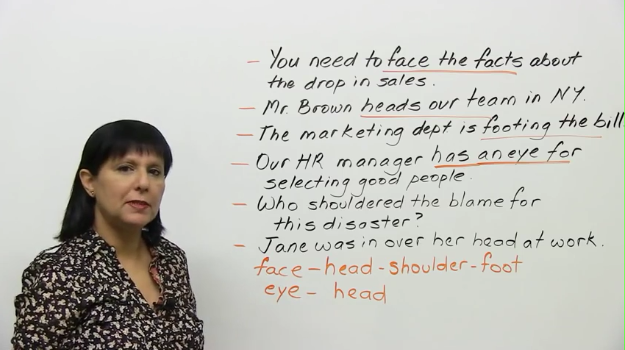Next one: Who shouldered the blame for this disaster? Who shouldered the blame? Expression: to shoulder the blame.
下一个:谁对对此次灾难负责?谁承担责任?此句习语为:承担责任。
To shoulder the blame means to take responsibility for something that went wrong, for a bad situation, for a difficult situation. To shoulder the blame.
承担责任指为某件错事负责,用在不好的情况中。
Again, you see a part of the body is mentioned in each of these idioms. All right?
你看,每个习语中都有身体部位。
And the last one we have here is: Jane was in over her head at work. Jane was in over her head.
最后一个习语是:Jane难以应付她的工作。
To be in over your head means to have too much responsibility, to have... to have something which is too difficult for you.
难于应付指的是要承担太多责任,对于你来说这些都太困难了。
Maybe you took a course in university and it was just way beyond your ability in mathematics or something else,
或者你在上学时,数学课或是其他课程超出你的能力范围,
so you went in over your head; it was too hard for you, too difficult for you. Okay? So Jane was in over her head at work. All right?
所以你难于应付,这对你来说太难了。因此,Jane难以应付她的工作。
So, one of the things you need to do is you need to know what... How to complete these. Right? How we complete them. So, for example,
你需要做的一件事就是,你需要知道如何在一段完整对话中使用这些习语。例如,
let's look at them. Try not to look up here. So if I say: what's the expression or what's the idiom?
试着不看这一部分。如果我说:我们学习的短语习语是什么?
To face the facts, To head the team, To shoulder the blame, To foot the bill, To have an eye for. All right? I already said that and To be in over your head. All right?
“面对现实”、“领导团队”、“承担责任”、“付款”、“对…有鉴别能力”以及“难于应付”。
Let's review what they mean. So which one means that you have an ability to notice something. This one: to have an eye for something. Good.
让我们复习一下它们含义。表示有注意到...的能力的习语是哪个。是“to have an eye for something”。
Which one means that you take responsibility when something goes wrong or you took responsibility because something went wrong?
哪个习语是指承担责任?
What did you do? You shouldered the blame. Good. Okay?
是“shouldered the blame”。

Which one means to accept that something bad has happened or accept the hard truth? This one: to face the facts. Very good.
哪个习语指发生不好的事情,需要接受这个艰难的事实?是“to face the facts”。
What does it mean when we say: Someone is in over their head? It means that they've taken on something that's too difficult for them or they have too much of it. Okay?
当我们说:某人难于应付某事时。是指他们承受了能力范围之外的事情或是他们有太多需要做的事情了。
Next one: which one means that you are paying for something? Here: to foot the bill. Okay?
下一个:哪个习语是指为某东西付款?是“to foot the bill”。
So play with them like that. Sometimes try to guess how they finish, sometimes try to guess the meaning.
就像这样进行练习。猜测这些习语的意思。
And, best of all, try to write your own sentences using these business idioms. All right?
当然最好能用这些习语造句。
If you'd like to do a quiz on this, please go to our website: www.engvid.com. All right?
如果你想做下相关小测试,请登录我们的网站:www.engvid.com
There you can also watch lots and lots of other videos. We have more than 500 videos at the moment.
网站上有很多其他视频。目前有超过500多个视频。
So you can improve your English in many ways. Actually, I'm wrong. It's not 500. It's more than 600 videos. Okay?
提高英语的方法有很多。事实上,网站上有600多个视频。
You could also subscribe to my YouTube channel to watch lots of other videos to help you improve your English. All the best with your English. Bye for now.
你也可以在YouTube订阅我们的栏目,观看更多视频帮助提高英语。我们下期见。











